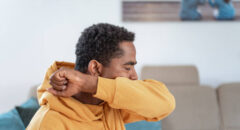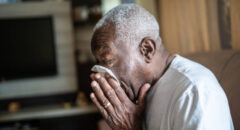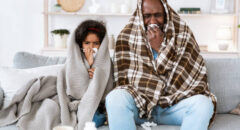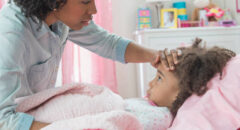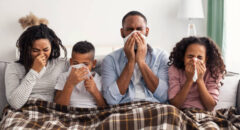six months old or younger, premature babies, children under the age of two, children with congenital heart disease, and children with compromised immune systems who suffer from neuromuscular disorders.
In the past, pregnant women could only obtain a vaccine that protected their newborns from severe RSV between weeks 32 and 36 of their pregnancies. You can still get the shot from September to January, and it’s highly advised.
According to health organizations like the CDC, American Lung Association, and the California Department of Public Health, there are other simple things that people can do daily to help stop the spread of respiratory infections like RSV:
- Stay home if you’re feeling sick.
- If you need to leave your home, consider wearing a mask in crowded or indoor areas.
- Wash your hands with soap and water for at least 20 seconds.
- Avoid touching your face with unwashed hands.
- Cover your mouth and nose when you cough and sneeze.
- Avoid close contact with others, such as kissing, shaking hands, and sharing cups and utensils.
- Clean frequently touched surfaces, including doorknobs and mobile devices.
What Are The Signs Of RSV?
The respiratory system is comprised of two parts: the upper and lower parts. The former contains the nasal passages and throat, while the latter includes the lungs.
An enormous number of people may get the infection. It may be acquired by direct contact with an infected person, through inhalation of viral droplets from their cough or sneeze, through touching a contaminated surface (such as a doorknob) and then touching your face before washing your hands, or through other indirect routes (for example, by kissing the face of a child with RSV). The virus may be spread by close contact with sick individuals, such as in crowded public spaces or through playing with infected children or siblings.
Tables and crib rails are ideal environments for RSV to live for hours, but tissues and palms provide a much more delicate environment.
An infected individual typically takes three to eight days to stop spreading RSV. The Centers for Disease Control and Prevention (CDC) report that viral transmission may persist for up to four weeks beyond the onset of symptoms in some individuals, including newborns and those with compromised immune systems.
The CDC warned that RSV might cause difficulties, but almost all infants receive the virus by age two.
According to health officials, if a parent notices any symptoms of an illness in their kid, they should contact their healthcare practitioner immediately.
According to health officials at Cedars-Sinai Medical Center, the most common symptoms include a runny nose, fever, cough, difficulty breathing, difficulty swallowing, breathing faster than usual, straining the chest or stomach while breathing, and turning blue around the lips and fingers.
Due to the similarity to other symptoms, the hospital recommends that parents take their kids to a doctor for a proper diagnosis.



